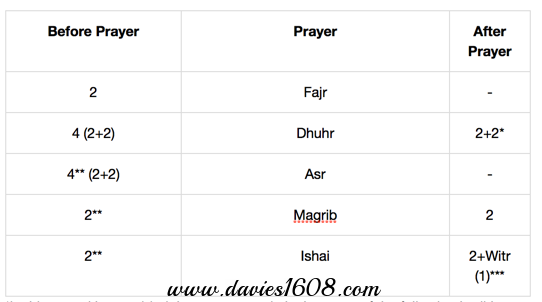Sunnah Prayers - Sunnah of the Obligatory Prayers
The Messenger of Allah (SAW) told us: “The first thing the people would be accountable for on the Day of Judgement will be prayer, Allah (SWT) will say to His angels: ‘Look at my servant’s fardh prayers. Were they complete or not?’. If they were complete, it would be written as complete. If they were not fully complete, Allah will say to the angels: ‘See if my servant has sunnah prayers’. If he has them, Allah will say: ‘Complete his obligatory prayers shortage with his voluntary prayers.’ Then the rest of his deeds will be dealt with in the same manner.” - Ahmad, Abu Dawood, Tirmidhi
This brings us to the second part of a three part series on Sunnah Prayers (first being an in-depth look at Salatul Duha).
Abu Harayrah (RA) narrated that the Prophet Muhammed (SAW) said: “Allah will build a house in Jannah for whoever is diligent in performing 12 sunnah rakahs (as follows: 4 rakahs before and 2 rakahs after the Dhuhr prayer, 2 after the Magrib prayer, 2 after the Ishai prayer and 2 before the Fajr prayer.” - Tirmidhi
*in this case, i have added the extra two rakahs because of the following hadith collected by Al-Nasaai and Tirmidhi narrated by Umm Habibah (RA) that the Prophet (SAW) said - “Whoever prays four rakahs before and after Dhuhr, Allah will forbid the fire from touching him.” Most scholars are of the opinion that if one limit himself to 2 rakahs after dhuhr, it is sufficient for him. Allah knows best.
**in the case of Asr, based on the following hadith recorded by Tirmidhi - “May Allah have mercy on the one who prays four rakahs before the Asr prayer.” In the case of Magrib - “Pray before Magrib, pray before Magrib and after saying it for the third time, added ‘for whoever wishes to do so’.” - Bukhari. These three situations are recommended but have no routine sunnah attached to them.
***Witr is always an odd number rakah.
The Sunnah of a prayer before is valid from the Athan to the start of the obligatory prayer and that of the sunnah after the prayer is valid from the end of that obligatory prayer to the Athan of next obligatory prayer. So for example, the 4 rakahs before Dhuhr will be valid from the call of the Athan to the start of Dhuhr and the 2 or 4 after will be valid from the end of Dhuhr up until the Athan of Asr is called. It is also allowed to make up missed sunnah rawaatib (amongst the 12 mentioned earlier) if for some reason one missed offering it at the prescribed time. This is based on the narration by Bukhari and Muslim from Umm Salamah (RA) according to which the Prophet (SAW) prayed 2 rakahs after Asr; she asked him about that and he said, "Some people from 'Abd al-Qays came to me and distracted me from offering the two rakahs that come after Dhuhr, so these are they."
The Prophet (SAW) said in regards to the sunnah of Fajr: “It is more superior than the world and everything within it.” - Muslim
Abdullah bin Shaqiq said: "I asked Aisha (RA) about voluntary prayers of the Prophet (SAW) and she replied: ‘Before Dhuhr, he used to pray 4 rakahs in his house, then go out to lead the people in prayer, then come in and pray two rakahs. He would lead people in Magrib, then come in and pray two rakahs. Then he would lead people in Ishai and enter my house and pray 2 rakahs. He would pray 9 rakahs during the night including witr. At night, he would pray for a long time standing and for a long time sitting; and when he recites the Quran while standing, he would bow and prostrate himself from the standing position.and when he recited while sitting, he would bow and prostrate himself form the sitting position. And when it was dawn (Fajr), he would pray 2 rakahs.” - Muslim
And Allah knows best. May Allah forgive me if I am wrong and guide us all unto the right path. Ameen.

